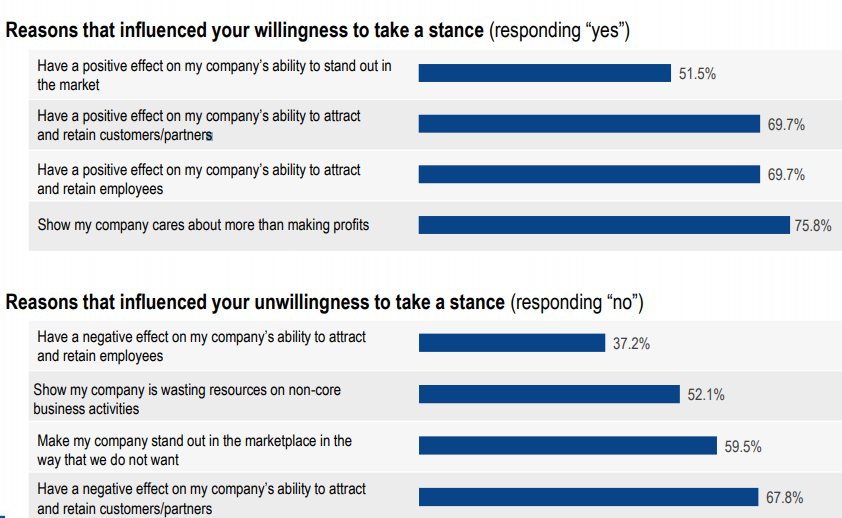 Despite recent high-profile examples of CEOs and corporations taking stands on social issues, most CEOs will remain focused on traditional business goals this year.
Despite recent high-profile examples of CEOs and corporations taking stands on social issues, most CEOs will remain focused on traditional business goals this year.
According to a new survey conducted by the USC Annenberg Center for Public Relations in conjunction with Chief Executive magazine, 44% of CEO respondents said their most important communication goal for 2019 is to sell their products and services, while 39% say their primary goal is to differentiate their company’s brand from the competition.
When asked which societal issue they planned on speaking publicly about, 60% of the 210 CEOs surveyed said they were unlikely to communicate about any social issue in 2019. However, about one-third of the CEOs are actively planning to speak out this year. For this group, the most pressing topics are data privacy (18%), healthcare (17%) and diversity and inclusion (11%). More controversial issues ranked much lower, such as immigration (6%) and “fake news” (5%).
“At a time when high-profile corporations like Nike and Levi Strauss are speaking out about societal issues, it’s fascinating to see that the majority of CEOs have little interest in being part of that conversation,” said Fred Cook, director of the USC Annenberg Center for Public Relations. “Most of them are more interested in using their communications channels to sell their products and build their brands.” That’s not altogether surprising.
Social Media, Online Influencers Rated Top Communications Channel
The channels for delivering information are also changing. Asked what communications strategies would be most valuable to their companies in the future, social media and online influencers were chosen by 30% of the CEOs, slightly ahead of original content distributed through their company’s channels (owned media) at 28%. Traditional media coverage ranked third at 11%, while only 9% said advertising was their most valuable means of communication.
“It’s clear that communications has become a critical discipline for today’s CEOs,” said Cook. “They view new tools and technology as valuable investments in achieving their future business goals.”
Most Marketing Executives Avoid Political Issues
The CMO Survey survey completed last October by Deloitte, the Duke Fuqua School of Business and the American Marketing Association also found little stomach for speaking out on issues.
Only 22.4% of 324 marketing executives surveyed believe it is appropriate for their brands to take a stance on politically charged issues, an increase from 18.4% in February 2018. The strongest reason to take a stand is to “show my company cares about more than making profits,” followed by attracting and retaining employees and attracting and retaining customers.
The most common reason not to take a stand is the worry that doing so will “have a negative effect on my company’s ability to attract and retain customers/partners.” They also feared that it would “make my company stand out in the marketplace in the way that we do not want” and “show my company is wasting resources on non-core business activities.”
PR will have a Role to Play
Although most companies will remain silent on contentious issues, research shows a significant – and growing – minority of executives ready to wade into controversial topics.
While many PR experts warn that taking sides can alienate some customers and employees, studies have found that CEOs can promote their businesses, attract customers, and increase sales by taking a public stance on public issues. As CEOs become more embroiled in political issues and other current events, corporate chief communications officers will assume more responsibilities selecting issues to tackle and developing communications strategies
“For corporate chief communication officers, this presents a huge opportunity to help CEOs navigate the pitfalls of speaking out, knowing that they can help build both the business and a more just world when they do so,” says Roger Bolton, president of the Arthur W. Page Society, an association for PR and communications executives and educators.
Some PR professionals urge businesses and CEOs to take the lead of social issues. Since trust in government leaders and the media has plummeted, businesses leaders should step into that leadership vacuum.
“In the face of heightened expectations on CEOs to step into the trust vacuum left by government, pressure is on them to do more — and quickly — to invoke a sense of certainty, reassurance and confidence with employees as well as the general public,” argues Stephen Kehoe, Edelman global chair, reputation.
Bottom line: Most businesses will emphasize increasing sales rather than taking positions on current social or political issues. Still, surveys show a growing trend of more CEOs willing to publicly comment on controversial issues. If the trend continues, corporate PR and communications professionals will play an instrumental role.
William J. Comcowich founded and served as CEO of CyberAlert LLC, the predecessor of Glean.info. He is currently serving as Interim CEO and member of the Board of Directors. Glean.info provides customized media monitoring, media measurement and analytics solutions across all types of traditional and social media.





